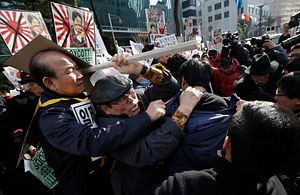For Asia, 2019 has a special significance. That’s because it is the centenary of a number of popular movements in the region that emerged simultaneously, spurred on by the end of the First World War and the 14 principles for peace outlined in 1918 by U.S. President Woodrow Wilson. Other major events that took place in 1919 were the May Fourth Movement in China, and the Non-Cooperation Movement in India in reaction to the Rowlatt Act. In this centenary year, numerous events commemorating nationalism will be held in Asia.
The Korean Peninsula is no exception. March 3, 2019 marks 100 years since the March 1st Movement, also known as the Sam-il Movement, a large-scale popular display of resistance that occurred in Keijō (Gyeongseong), an administrative district of Korea under Japanese rule that corresponds to present-day Seoul. And April 11 is the 100th anniversary of the establishment of the Provisional Government of the Republic of Korea by activists in Shanghai, China, which occurred on the back of this movement.
Events to commemorate these milestones of a century ago will be held across Asia in the coming months, but in South Korea their significance goes beyond nostalgia. Our view of the events of 1919 relates directly to the present in the context of South Korea and surrounding countries. That is to say, it relates to the origins of Korea as a nation.
Unlike many other Asian countries, South Korea’s independence is not the direct result of the victory of a movement against a colonial power. Rather, despite persistent movements by the people on the Korean Peninsula, Japan showed no signs of relinquishing control, and colonial rule ended only because it was defeated in the Second World War and forced to abandon it by the Allied Powers.
In many Asian countries, the legitimacy of a new state was secured by the achievements of the independence movement, with the leaders of the movement becoming heads of state as “founding fathers.” However, in for both South Korea and North Korea, independence was granted from the outside, so leaders of the movement were unable to use the independence movement to justify themselves or the legitimacy of the political power that they commanded. This had a significant impact on their legitimacy as nations.
The tradition of the March 1st Movement was invoked by people in the southern part of the Korean Peninsula to secure the legitimacy of the new nation, and the Provisional Government of the Republic of Korea was established. In other words, the Republic of Korea, established in 1948, justified itself by positioning itself as the direct successor of this government in exile. This logic underpinning the legitimacy of the Republic of Korea has been retained to the present day in the preamble of the Constitution.
This logic will again come under a spotlight in the 100th anniversary events. However, it has special significance on a number of levels. The first is the impact on relations between Japan and South Korea. What is important is that the logic that considered the Provisional Republic of Korea Government as a legitimate government in exile – although its existence was not recognized as a “nation” by the majority of the allies other than as a support for the Republic of China – rules out the legitimacy of the Korean government at the time the Korean Peninsula was under Japanese rule. For if the Provisional Government was a legitimate government, sovereignty over the Korean Peninsula resided with the Provisional Government, and all legal acts during the period of Japanese rule that eliminated its power of influence can be rejected as illegal (which is why it does not extend to the 1965 Agreement on the Settlement of Problems Concerning Property and Claims and on Economic Co-operation between Japan and the Republic of Korea).
Needless to say, the logic that any Japanese claim to the Korean Peninsula was illegitimate from the outset was used in the ruling by the Supreme Court of Korea on October 30, 2018 concerning conscripted factory workers. At the ceremonies commemorating the 100th anniversary of the March 1st Movement and the establishment of the Provisional Government of the Republic of Korea, the president and other prominent figures in South Korea will repeat their views based on this thinking. This will stimulate the Japanese government and public opinion, which are already sensitive to developments in South Korea.
This will cast a further shadow on relations between North and South Korea. The North Korean government regards the anti-Japan independence movement in the Korean Peninsula as a fundamental achievement of Kim Il-sung, grandfather of Kim Jong-un. As such, South Korea’s logic is seen as an obstacle to the legitimacy of North Korea as a nation. Naturally, this is an impediment to potentially improving relations between North and South.
The arrival of the season to think about the legitimacy of the Republic of Korea inevitably has an impact on relations with surrounding countries. Importantly, in many cases, the logic that underpins the legitimacy of the nation contains “narratives” that affect relations with neighboring countries. Normally, such discussion would be confined to the country itself. However, when it attracts particularly wide coverage and especially once it is reported overseas, it arouses neighboring countries that have different legitimacies. This demands considerable delicacy, otherwise good relations with surrounding countries may be damaged and diplomatic efforts wasted.
History may well view 2019 as being in the middle of an age of nationalism. With movements also arising in great powers such as China and the United States, regional instability looks set to continue.
Kan Kimura is a professor at Kobe University.

































